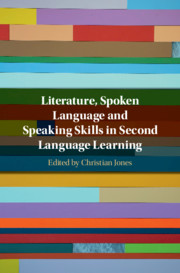Book contents
- Literature, Spoken Language and Speaking Skills in Second Language Learning
- Literature, Spoken Language and Speaking Skills in Second Language Learning
- Copyright page
- Contents
- Figures and Tables
- Contributors
- Foreword
- Acknowledgements
- 1 Introduction
- Part I Literature and Spoken Language
- 2 The Realism of Conversation in Literature
- 3 Using Literature in Text-Driven Materials to Help Develop Spoken Language Awareness
- 4 Literature, TV Drama and Spoken Language Awareness
- 5 Haiku and Spoken Language: Corpus-Driven Analyses of Linguistic Features in English Language Haiku Writing
- 6 Screenplays as a Pedagogical Medium for Cultivating EFL Learners’ Metapragmatic Awareness of Speech Acts in Spoken English
- Part II Literature and Speaking Skills
- Index
- References
6 - Screenplays as a Pedagogical Medium for Cultivating EFL Learners’ Metapragmatic Awareness of Speech Acts in Spoken English
from Part I - Literature and Spoken Language
Published online by Cambridge University Press: 18 October 2019
- Literature, Spoken Language and Speaking Skills in Second Language Learning
- Literature, Spoken Language and Speaking Skills in Second Language Learning
- Copyright page
- Contents
- Figures and Tables
- Contributors
- Foreword
- Acknowledgements
- 1 Introduction
- Part I Literature and Spoken Language
- 2 The Realism of Conversation in Literature
- 3 Using Literature in Text-Driven Materials to Help Develop Spoken Language Awareness
- 4 Literature, TV Drama and Spoken Language Awareness
- 5 Haiku and Spoken Language: Corpus-Driven Analyses of Linguistic Features in English Language Haiku Writing
- 6 Screenplays as a Pedagogical Medium for Cultivating EFL Learners’ Metapragmatic Awareness of Speech Acts in Spoken English
- Part II Literature and Speaking Skills
- Index
- References
Summary
This chapter reports a thirteen-week action research project that was conducted with sixty-seven first-year non-English-major students taking a mandatory general English course in a Chinese state university. Using English professional screenplays as the source of authentic conversations, we designed and implemented an intervention that enabled the English as a Foreign Language (EFL) students to consider how the realisation of a speech act is mediated by a range of contextual factors. We achieved this by: (1) selecting screenplay extracts that reflect varied communication situations, (2) using conversation analysis and Hymes’ () SPEAKING model as guiding frameworks, (3) combining awareness-raising tasks with explicit instruction and (4) setting up weekly group work. From two iterative cycles of research, the following qualitative data were collected: (1) two open-ended questionnaires, (2) audio recordings of classroom interaction, (3) our own observation and reflective notes and (4) the conversations and self-reflection created by the students each week. The results show that English screenplays helped to develop the Chinese EFL students’ metapragmatic awareness by providing rich conversational, social and literary contexts to a speech act. The screenplays also enabled the students’ resourcefulness as social actors, fans of pop culture or creative individuals in their interpretation and formulation of varied second language (L2) speech acts. This holds implications particularly for EFL teachers in challenging circumstances such as the one where this study took place: large class sizes, limited class time and students having only limited access to naturally occurring English conversations. The findings also hold implications for the establishment of an interactional learning space facilitated by English screenplays and teacher scaffolding.
- Type
- Chapter
- Information
- Publisher: Cambridge University PressPrint publication year: 2019
References
- 2
- Cited by

